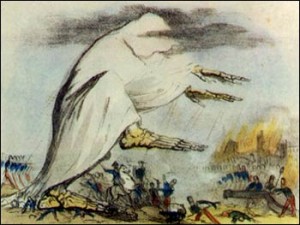Housekeeping in Haitian Creole XVIII – Squeaky clean, so to speak

A representation of the cholera epidemic of the 19th century depicts the spread of the disease in the form of poisonous air
Learning a foreign language is all about the nuances of a foreign people’s thought-processes. What matters to them is what informs the way they speak.
So it is with kreyol and Haiti’s apparent fixation on pwopte, the injunction to clean.
I wish I could say I see evidence of this linguistic preoccupation with cleanliness on the streets of the Haitian capital Port au Prince. Alas not. Like Julian Fantino, Canada’s straight-talking minister for international development, I must confess there doesn’t seem to be a whole lot of effort dedicated to picking up the trash.
That said, it’s reassuring in its own way to find kreyol language lessons devoting whole exercises to pwopte.
Pwopte ko ou – clean your body
Se pa fasil pou moun pwop tonbe malad – it’s not easy for clean people to fall sick
Two sentences from my recent kreyol lesson.
As P J O’Rourke once said, cleanliness becomes more important when godliness is unlikely.
But I digress.
My kreyol lesson goes on to describe the various things ‘clean people’ need to do to maintain their state of being:
– Pwopte tet, figi, bouch, nen, zorey, men ak pye, anba bra, zong yo, anfen tout ko a (wash hair, face, lips, nose, ears, hands and feet, underarms, fingernails, all the body)
– Pwopte tou sa ki viwonnen ou – clean all around you (your environment)
– Pwopte manje – wash your food
– Pwopte tout kalite veso ou ap sevi (Wash al dishes before you use them)
And there you have it. A four-pronged lesson in disease-prevention in Haitian Creole. But as life – its organic lived reality – attests, it’s not always that easy for most people in Haiti.
T’was well said that cleanliness is next to impossible. I have yet to figure out the idiomatic kreyol expression for that.


